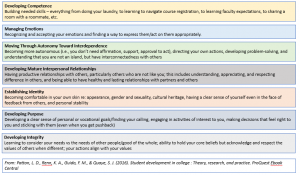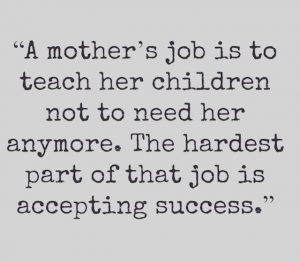Important inner work your students do outside of the classroom
Today’s message is about the important – and challenging, and amazing – work of parenting college students. I saw this on one of my social media feeds the other day, and it resonated with me as I think of my own Class of ’27 Deac (still in high school).
Whether we are mothers or fathers or grandparents or loving family members or guardians, I’m confident that we all want our kids to get over the finish line, so to speak, so they can be successful, independent adults.
I wanted to share something with you, if you’ll allow me to nerd out for a moment 🙂 One of the classes I took in grad school was about student development, and the various processes students go through while in college to help shape their identity as adults. One of the more famous theories about this was from scholars Chickering and Reisser (1993). They talk about seven vectors that are critical to students’ development.  I have roughly paraphrased the vectors and tried to give my own examples below, but full credit given to my student development textbook (citation in the graphic; click to enlarge).
I have roughly paraphrased the vectors and tried to give my own examples below, but full credit given to my student development textbook (citation in the graphic; click to enlarge).
Developing Competence – Building needed skills – everything from doing your laundry, to learning to navigate course registration, to learning faculty expectations, to sharing a room with a roommate, etc.
Managing Emotions – Recognizing and accepting your emotions and finding a way to express them/act on them appropriately.
Moving Through Autonomy Toward Interdependence – Becoming more autonomous (i.e., you don’t need affirmation, support, approval to act), directing your own actions, developing problem-solving, and understanding that you are not an island, but have interconnectedness with others
Developing Mature Interpersonal Relationships – Having productive relationships with others, particularly others who are not like you; this includes understanding, appreciating, and respecting difference in others, and being able to have healthy and lasting relationships with partners and others
Establishing Identity – Becoming comfortable in your own skin re: appearance, gender and sexuality, cultural heritage, etc.; having a clear sense of yourself even in the face of feedback from others, and personal stability
Developing Purpose – Developing a clear sense of personal or vocational goals/finding your calling, engaging in activities of interest to you, making decisions that feel right to you and sticking with them (even when you get pushback)
Developing Integrity – Learning to consider your needs vs the needs of other people/good of the whole; ability to hold your core beliefs but acknowledge and respect the values of others when different; your actions align with your values
So how do parents and families fit in with these developmental stages? First is simply to be aware that this development is taking place, and that your students are learning – often through trial and error – how to grow into themselves. While every student will vary in terms of when and how they move through these stages, typically the early vectors might correspond to younger students, and the latter ones to older students.
Second, to give them space and freedom as they are on this journey. Example: they need practice in developing competence – so the more we help, the less they grow. This is where Stop, Drop, and Roll comes in 🙂 By extension, if you ask me how to help your student with something and I encourage you to have your student do the work/make the call/schedule a meeting with me to discuss it (rather than me give the answer to you), understand that my goal is to help your student grow and give them what they need to take these developmental steps forward 🙂
Third, to recognize that as they become more mature, they might ask for your help less, or might choose not to follow the advice you give them. This is normal and part of the student development process, and is not a repudiation of your parenting or your values. Successfully moving towards adulthood means that students become more confident in their own decisions and are not relying on the affirmation of family, friends, or others as they chart their course.
Fourth, to love and accept them for who they are, in all senses of that word. An example: you don’t have to share their life’s purpose, but you can accept and affirm that their purpose is right for them.
That’s my very brief, high level interpretation of student development. But I hope it might be helpful in understanding some of the inner work your students are doing (even though they are not consciously aware of it!) and how you can best support them.

